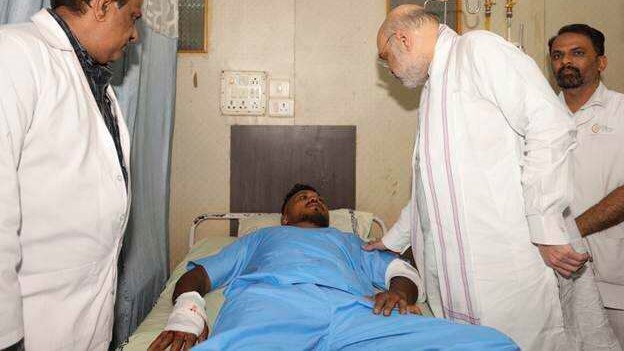Jury deliberations begin in Nipsey Hussle trial; lawyer notes rapper's work to uplift community
"He was a father, he was a son, he was a human being," said Los Angeles County Deputy District Attorney John McKinney.

LOS ANGELES (KABC) -- In Thursday's closing arguments, the prosecution called rapper Nipsey Hussle a favorite son of South Los Angeles, and that while he was a gang member as a young man, he changed his life around, became successful, and stayed in the neighborhood to help others.
"He was a father, he was a son, he was a human being," said Los Angeles County Deputy District Attorney John McKinney.
The defendant, Eric Holder Jr., sat quietly as he saw the evidence on a monitor.
Hussle was killed on March 31, 2019. Surveillance video shows Holder walking up to Hussle carrying two handguns and then started shooting shortly after.
The prosecution stressed that this was a deliberate act that qualifies as first degree murder.
He said Holder was in a vehicle with another person and that person saw him with a weapon.
"He was already planning. Planning and premeditation, thinking about it before you do it," said McKinney.
Holder's defense attorney Aaron Jansen presented a short defense Wednesday. On Thursday, he told jurors when Holder was accused of being a snitch, it was something so serious in gang culture, that it could lead to getting beat up or killed.
"Think about Eric's state of mind at this point. I just came over to say hello. I haven't been around for a while. I'm not involved in that lifestyle anymore, and the famous, the great Nipsey Hussle saying that they have paperwork on me? What's this guy's angle?" said Jansen. "Why is he doing that? Why is he doing it in this public manner? Why is Nipsey Hussle saying that they have paperwork which is calling him a snitch?"
Hussle and Holder were both rappers, one successful, one unsuccessful, who grew up as members of the same South L.A. gang, the Rollin' 60s, McKinney said.
He showed the jurors a photo, taken moments before the shooting, of Hussle crouching down with a toddler wearing a shirt that read "Crenshaw," bought from Hussle's South LA clothing store, The Marathon, that they were standing outside of.
"He was no longer a gangbanger. He was a world-known recording artist and so much more," the prosecutor said. "It really is a shame that his life was so brutally and coldly taken, on his own property, in his own neighborhood, by someone from his own gang. By somebody that he considered a friend."
Jansen painted a similar picture of Holder, saying he had grown beyond his young gang life and moved miles away.
"By 2019 he had completely put the Rollin' 60s in his rearview mirror," Jansen said. "He was just living his life in Long Beach."
Holder had not been to the neighborhood where he grew up in years, and only stopped at Hussle's shopping center with a friend because he had a craving for food from a favorite fast-food place there. Jansen said he then found himself blindsided.
"This was a serious accusation that someone of Nipsey Hussle's stature was making against little Eric Holder Jr., who had just come into the neighborhood to get his chili-cheese fries," Jansen said.
He said it gave Holder reason to fear for his life and safety.
"What if he calls you a snitch in a song, and names you?" Jansen said.
McKinney downplayed this apparent motive, calling it a calm conversation that was "in the nature of advice," and saying no one who observed it thought there was any real hostility or imminent danger.
"I submit to you that the motive for killing Nipsey Hussle had little or nothing to do with the conversation they had," McKinney said. "There was already a preexisting jealousy or envy."
There had been no testimony to this effect during the trial, and the defense objected. The judge let the statement stand, but reminded jurors to focus on the actual evidence from the trial.
McKinney used the extensive surveillance and police body-camera images surrounding the shooting to take the jurors through a minute-by-minute narrative of the day.
He repeatedly showed the video, taken by a camera across a parking lot, of the moment Holder appeared with guns and Hussle collapsed to the ground.
Holder was gone for about 10 minutes before returning and firing. McKinney told jurors that it was plenty of time for premeditation as defined by the law.
"He thought about it and he did it," McKinney said. "That's all premeditated means. It doesn't mean he planned it for weeks."
Jansen countered that it was "a short period of time for such a serious, life threatening provocation."
"Clearly, emotions did not have time to clear in that short an amount of time," the defense attorney said. "There was no cooling off period. There was no time to reflect."
He even said the fact that Holder kicked Hussle in the head while he was on the ground is evidence that the lesser charge is more apt.
"That shows rage," Jansen said. "That shows heat of passion."
The case is now in the hands of the jury, and they have to deal with some complicated legal issues.
The Associated Press contributed to this report.











